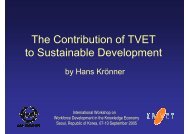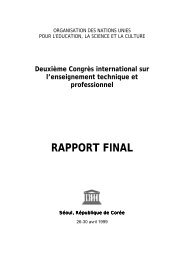Learning for Life, Work and the Future Initial ... - Unesco-Unevoc
Learning for Life, Work and the Future Initial ... - Unesco-Unevoc
Learning for Life, Work and the Future Initial ... - Unesco-Unevoc
You also want an ePaper? Increase the reach of your titles
YUMPU automatically turns print PDFs into web optimized ePapers that Google loves.
Page 74 Participants’ Papers <strong>Learning</strong> <strong>for</strong> <strong>Life</strong>, <strong>Work</strong> <strong>and</strong> <strong>the</strong> <strong>Future</strong><br />
22 NAICKER, Vinaykomar (Botswana): IT Skills of Educators<br />
1. Introduction<br />
Computers <strong>for</strong>m a major part of <strong>the</strong> development of<br />
mankind. The computer has enabled man to do<br />
virtually <strong>the</strong> “impossible” − monitored space travel,<br />
travel at <strong>the</strong> speed of light, space exploration, to name<br />
but a few. Computers have become a time-saving<br />
devise ensuring that everything from space travel to<br />
washing of clothing is completed without much ef<strong>for</strong>t.<br />
Yet it is frightening to see that <strong>the</strong> education system in<br />
Africa is not taking computer literacy seriously.<br />
A survey was carried out in schools in Gaborone:<br />
primary schools, junior secondary schools, senior<br />
secondary schools as well as a teacher colleges of<br />
education.<br />
2. Findings<br />
• It has been found that at <strong>the</strong> community schools<br />
only 3% of educators are computer literate. 2% of<br />
<strong>the</strong>se teachers are expatriates. The Ministry of<br />
Education has trained <strong>the</strong> 1% of educators that are<br />
computer literate with a five-day course that does<br />
not necessarily constitute computer literacy, but<br />
ra<strong>the</strong>r computer awareness.<br />
• In <strong>the</strong> schools that <strong>the</strong> surveys were done, it was<br />
ga<strong>the</strong>red that no primary school pupil is exposed to<br />
any computer skills. Teachers are also not computer<br />
literate, due to <strong>the</strong> fact that <strong>the</strong>y feel it does<br />
not help with <strong>the</strong>ir daily job description.<br />
• The administration of <strong>the</strong> schools is done manually.<br />
50% of schools have two computers <strong>for</strong> administration<br />
purposes. They were utilised by educators<br />
to type out <strong>the</strong>ir tests. No classroom in any of <strong>the</strong><br />
schools where surveys were done was equipped<br />
with a computer <strong>for</strong> enrichment or remedial work.<br />
• In <strong>the</strong> junior secondary schools, it was found that<br />
one in ten schools have computers. At <strong>the</strong> one<br />
school visited, <strong>the</strong> government donated 20 computers.<br />
It was ga<strong>the</strong>red that <strong>the</strong> computers have been<br />
at <strong>the</strong> school <strong>for</strong> four months but were not used as<br />
part of <strong>the</strong> curriculum. Hence, <strong>the</strong>re is wastage of<br />
an important education tool. The syllabus that has<br />
been put into place does not cover all <strong>the</strong> necessary<br />
fields of study. It is a three-year syllabus that tends<br />
to place lots of emphasis on clip-art. It is disappointing<br />
to have learnt that a computer was<br />
looked at as a section that needed to be completed<br />
in Business Studies.<br />
• The reason that <strong>the</strong> computers are not being used at<br />
<strong>the</strong> school is due to <strong>the</strong> co-ordinator not being<br />
thoroughly trained to conduct <strong>the</strong> necessary classes<br />
in computer awareness. The co-ordinator has been<br />
<strong>for</strong> a five-day course that has proved to be insufficient<br />
in allowing <strong>the</strong> individual <strong>the</strong> ability to<br />
develop confidence with <strong>the</strong> subject matter in order<br />
to carry out <strong>the</strong> various classes.<br />
• At senior secondary schools, pupils are introduced<br />
to computer skills. It has been found that <strong>the</strong><br />
teachers have only basic computer skills <strong>the</strong>mselves.<br />
Computer laboratories do exist in <strong>the</strong> senior<br />
secondary schools. This enables <strong>the</strong> average<br />
student of a public school only three years of<br />
exposure to <strong>the</strong> IT world. In comparison to students<br />
in <strong>the</strong> USA or Europe who have almost 85%<br />
contact with computers in <strong>the</strong>ir daily learning:<br />
from reception to year twelve.<br />
• It is pleasing to note that <strong>the</strong> private schools that<br />
were visited have computer literacy as part of <strong>the</strong>ir<br />
school curriculum. Students from reception are<br />
exposed to computers, by means of games, integrated<br />
studies using <strong>the</strong> computer, remedial as well<br />
as enrichment programmes. Formal introduction to<br />
computer program language <strong>for</strong>ms part of <strong>the</strong><br />
syllabus.<br />
• 78% of <strong>the</strong> educators at private schools are computer<br />
literate. <strong>Work</strong>shops on <strong>the</strong> usage <strong>and</strong> implementation<br />
of computers in classroom activities are<br />
done on a continuous basis. A principal at one<br />
private school stated that <strong>the</strong> ideal situation would<br />
be where a few computers are found in each classroom<br />
so that students have access to a computer at<br />
all times. Students are encouraged to use a<br />
computer <strong>and</strong> <strong>the</strong> Internet when doing project work.<br />
3. Deductions<br />
• It has been established that In<strong>for</strong>mation Technology<br />
skills are sadly lacking at <strong>the</strong> community schools<br />
around Gaborone.<br />
• Even though <strong>the</strong> government has taken <strong>the</strong> plunge<br />
to supply schools with computers, <strong>the</strong>re seems to be<br />
no system under which <strong>the</strong>se computers are<br />
distributed.<br />
• Teacher training has been neglected in <strong>the</strong> IT field.<br />
• Computer literacy does not <strong>for</strong>m part of teacher<br />
training at <strong>the</strong> colleges of education unless <strong>the</strong><br />
training is in connection to senior secondary<br />
teaching.<br />
• Teachers are not exposed to any computer programming<br />
language that will enable <strong>the</strong>m to be creative<br />
in <strong>the</strong>ir teaching: ei<strong>the</strong>r in <strong>the</strong> use of a computer as<br />
an apparatus or tool to develop teaching resources;<br />
as an apparatus to enhance teaching in <strong>the</strong> classroom;<br />
to extract in<strong>for</strong>mation from <strong>the</strong> Internet to<br />
enrich subject matter.<br />
• Many teachers are fearful of using <strong>the</strong> computer to<br />
enhance <strong>the</strong>ir teaching methods.





